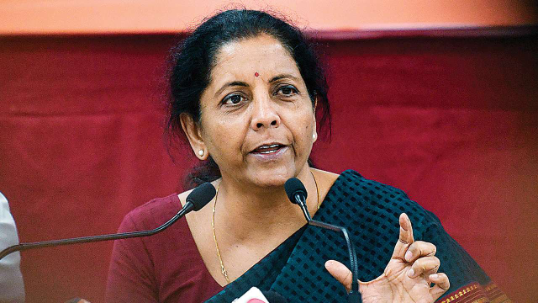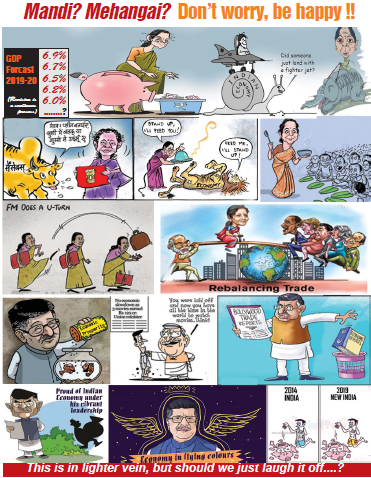Want to Subscribe?
Read Corporate India and add to your Business Intelligence

![]() Unlock Unlimited Access
Unlock Unlimited Access

Editorial 123 15
After the economic cookie crumbled, the Indian economy is plunging further into the abyss day by day, as if to vindicate the prognosis of newly appointed IMF chief Kristalina Georgieva that ‘economic slowdown will be more pronounced in India’. With a sharp decline in consumption demand and the failure of the government to boost exports, the wheels of industry have slowed down distinctly. The latest available figures for August 2019 are shocking — manufacturing has shrunk 1.2 per cent, the worst showing in the last six years. Even worse, production of capital goods has slumped 21 per cent – the biggest fall in the new IIP series devised by the Modi government. The worsening economic slowdown has adversely affected new investments. During Q1 of fiscal 2020, new private sector project investments have tumbled by 70 per cent to Rs. 95,300 crore, as compared to the corresponding period last year.
Needless to say, the pace of economic growth has slumped. During the last quarter, the GDP growth plunged to 5 per cent, that too as per the formula devised by the Modi government. (As per the former Chief Economic Adviser to the present government, the actual growth rate works out to 2.5 per cent – below even the once-popular ‘Hindu’ rate of growth.) For the whole fiscal year 2020, the Reserve Bank has reduced the growth rate from earlier estimates of 6.8 per cent to 6.1 per cent, while some economists feel that even this estimate is over-optimistic. Global rating agency Moody’s has brought down its estimate from 6.2 per cent to 5.8 per cent, while the Asian Development Bank has pruned its estimate from 7.2 per cent to 6.5 per cent.
There has been a long-drawn-out official denial of any slowdown in the economy. Ruling party spokesmen went on chanting the mantra of ‘fastest-growing economy in the world’. For them, everything was hunky-dory and thanks to the government’s progressive policies and economic reforms, life for around 125 crore Indians was happy and cheerful. However, the lid on the truth had to eventually come off. Various industries suffered a slowdown, leading to retrenchments on a large scale. The corporate sector started facing an acute liquidity crunch.
The government has at last, albeit reluctantly, accepted the stark reality. After presently a budget which refused to recognize the deep trouble in the economy, Finance Minister Nirmala Sitharaman has had to backtrack and offer some quick-fix tax sops.
But viewed in the context of the worsening situation on the economic front, aided by global recessionary trends, these steps are not enough. Realising the gravity of the situation, the government will have to work on various fronts. First of all, a comprehensive plan should be formulated to boost demand for consumption at home and for exports. The government has taken a small step in this direction by raising the dearness allowance of government employees and pensioners. To begin with, personal income-tax should be reduced with immediate effect in order to leave more cash in the pockets of people. Secondly, GST rates are still on the high side in several cases and should be reduced. In fact, in the case of non-star hotels and restaurants, GST should be abolished altogether.
On the export front, we will have to take concerted imaginative and effective measures to push up our exports. China’s economic debacle, the Sino-US trade wars, declining prices of several raw materials, the vast scope for horticulture development, etc., provide huge opportunities for our exporters. But reluctance on the part of the government to encourage exports has led to the wasting of these opportunities.
Banking as well as non-banking entities should be made viable in the real sense of the word. Serious steps should be taken to clear their dues running into billions. It is a tragi-comic situation where the number of crorepatis is on the steady rise while at the same time their dues are also on the rise. If the hitherto ‘fastest-growing economy’ mantra does not end up making India a global laughing stock, all the above measures, and more, will have to be put in place, and at record speed.
Cover story 123 15

As the current business slowdown sweeps across the Indian economy, it is having an adverse impact on corporate performance. Little wonder then that the corporate show during the second quarter of fiscal 2020 was tepid, with most sectors including automobiles, construction, steel, textiles, FMCG, paints, shipping and pharmaceuticals putting up a weak to listless performance.
Analyst's Corner 123 15
Axis Bank is one of the first new-generation private sector banks to have begun operations in 1994. Promoted jointly by the Specified Undertaking of Unit Trust of India (SUUTI) (then known as Unit Trust of India), Life Insurance Corporation of India (LIC), General Insurance Corporation of India (GIC), National Insurance Company Ltd., The New India Assurance Company, The Oriental Insurance Company and United India Insurance Company.
Corporate Report 123 15

Hind Rectifiers
Lorem ipsum dolor sit amet, consectetur adipisicing elit, sed do eiusmod tempor incididunt ut labore et dolore magna aliqua. Ut enim ad minim veniam, quis nostrud
Expert Opinion 123 15
India is finally conceding that her economy is in trouble. The country’s gross domestic product (GDP) in the April-June quarter of 2019 grew at a meagre 5%, the lowest in six years. This is a steep fall from the roughly 8% growth clocked in the same period about two years ago. It is rather alarming that even this 5% growth is an overestimation, given the many infirmities in India’s revised GDP estimation methodology introduced four years ago.
- Dr. V. V. L. N. Sastry (Jurist and Financial Economist)
Special Report 123 15

With behemoths like the US and China clashing over tariffs, global trade itself has been negatively affected, including equities, bonds, currencies, company profits, services and investments.
Special Report 123 15

With behemoths like the US and China clashing over tariffs, global trade itself has been negatively affected, including equities, bonds, currencies, company profits, services and investments.
Economy 123 15
In line with the contraction in the core sector (-0.5% in Aug'19), and signaling a deep slowdown in the economy, the industrial output growth contracted for the first time in the past 2 years (26 months). In the month of August'19, the index of industrial production (IIP) growth contracted for the first time since Jul'17 by 1.1% as against a growth by 4.8% in August'18 and 4.3% in the previous month. CARE Ratings' had expected the industrial output to grow at 1.5% in Aug'19.
Business Management 123 15

Organizations need to adopt competitive strategies for their existence and for maintaining their position in the market. When it comes to adopting a competitive strategy.
Commodities 123 15

The planters who produce the cup that the cheers have lost their own cheer, as the plantation industry that flourishes in the highlands
Book Review 123 15
The general axiom/ saying that it is always much easier to get to the top or ascend the peak than to remain in that same position for quite some time is very much true in the case of CEOs and corporates. It is very common to observe that top-rated companies find it difficult to retain the number one position year after year and, for some reason or the other, they slip to lower positions.
- V. Raghuraman
In Lighter Vein 123 15


February 15, 2025 - First Issue

Industry Review

Want to Subscribe?
Read Corporate India and add to your Business Intelligence

![]() Unlock Unlimited Access
Unlock Unlimited Access
Lighter Vein

Popular Stories
Archives
